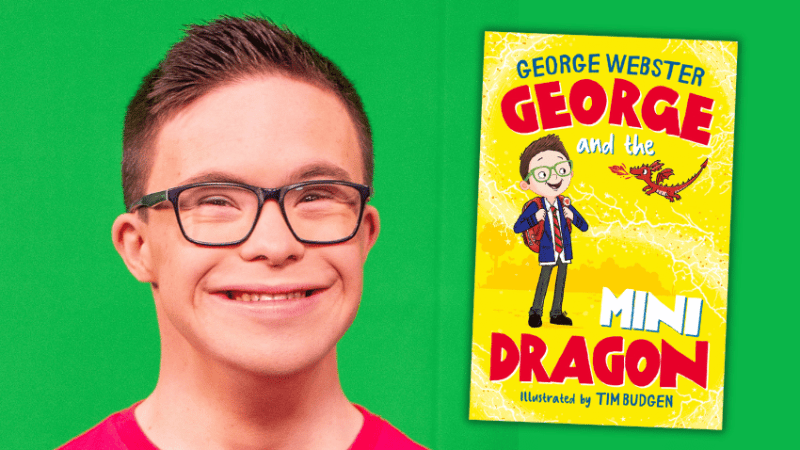Modal verbs KS2 – Best examples, activities and resources
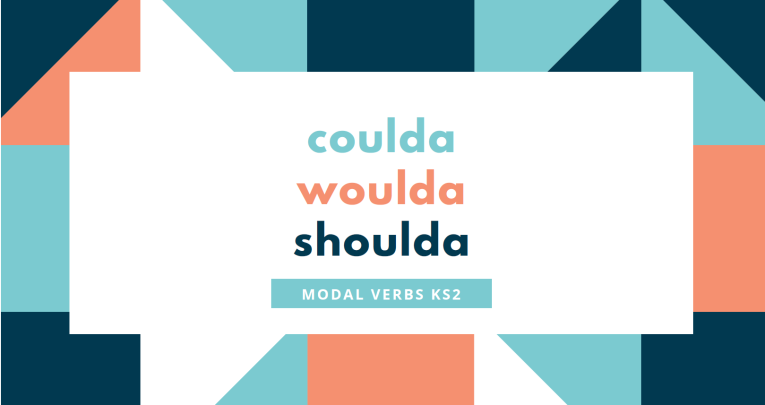
What is a modal verb? Help children get to grips with this element of grammar with these teaching resources, lesson plans and other ideas for primary…

- by Emma Cate Stokes
- Writer, former teacher and co-founder of EdTech Innovation Hub Visit website
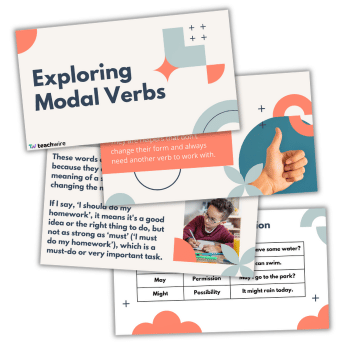
As educators, we’re always looking for innovative ways to teach language concepts. Modal verbs, those crucial parts of English grammar, are no exception. So, let’s dive in and explore modal verbs KS2 examples. Plus, we’ve also got a selection of engaging activities designed to help your students not just learn but truly master these essential elements.
We’ll also explore how modal verbs can be a game-changer in persuasive writing, enhancing your students’ ability to communicate with impact and clarity.
What are modal verbs?
Modal verbs are special verbs that modify other verbs, adding layers of meaning like:
- possibility
- ability
- obligation
- necessity
These verbs are distinct because they don’t follow the usual verb conjugation rules and lack suffixes.
The primary modal verbs include:
- will
- would
- can
- could
- may
- might
- shall
- should
- must
- ought
Understanding these verbs is essential for students to express themselves clearly and appropriately in different contexts.
National Curriculum English programme of study links
Using modal verbs or adverbs to indicate degrees of possibility.
Examples of modal verbs
| Modal verb | Application | Example |
| Can/could | Ability or possibility | She can solve complex problems. |
| May/might | Permission or likelihood | You may start the test now. |
| Must/ought to | Obligation or advice | You must finish your homework. |
| Shall/will | Future actions or offers | We shall discuss this tomorrow. |
| Should | Advice or expectation | You should check your work. |
Modal verbs activity ideas
Modal verb charades
Students act out scenarios using modal verbs. For example, a student pretends to be locked out of their house. Classmates guess, “You can’t get in!” or “You must find your key!”.
Modal verb storytelling
Create a story together where each sentence must contain a modal verb. This creative use of language reinforces modal verb understanding. For example, start with “Once upon a time, a wizard could turn anything to gold”. Each student then adds a sentence.
Role-play dialogues
Students pair up and engage in conversations using modal verbs. Provide scenarios like asking for permission, giving advice, or making predictions. For example, one student asks, “May I borrow your book?” and the other responds, “You should return it tomorrow.”
Modal verb debate
Organise debates on light-hearted topics. Students must use modal verbs in their arguments, like “You should consider…” or “We must not forget…”. For example, you might debate “School uniforms should be mandatory.”
Students can use sentences like “Students must express individuality.”
Create your own modal verb rules
Ask students to make up a fictional world with unique rules using modal verbs, For example:
- “In this world, people must hop on one foot when happy.”
- “You must sing to greet someone.”
Modal verb quiz show
Host a quiz where students must answer questions using modal verbs or identify the modal verb in a sentence.
Example: “What modal verb completes this sentence correctly? ‘You _____ be quiet in the library.'”
More modal verbs KS2 resources
Persuasive writing modal verbs lesson
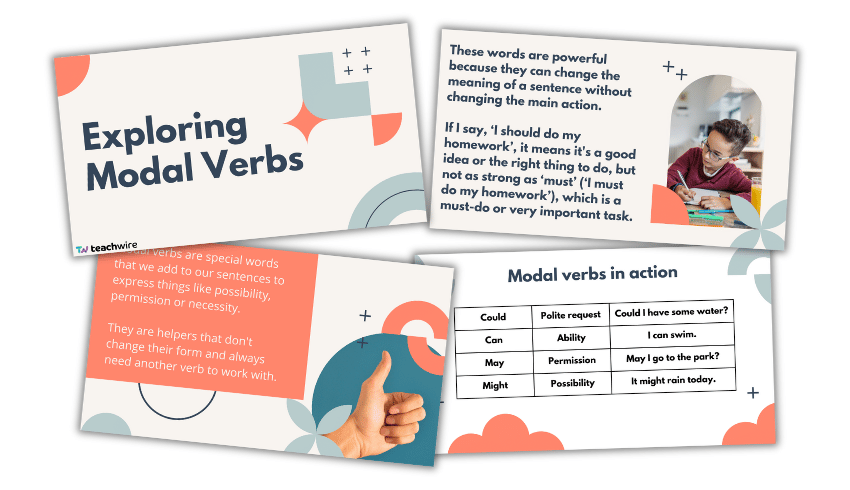
This modal verbs KS2 PowerPoint resource offers a comprehensive and interactive exploration of modal verbs and their application in persuasive writing.
Modal verbs KS2 lesson pack

This grammar resources pack from Plazoom provides everything you need to teach a series of five lessons on modal verbs, culminating in an extended writing task where children can use their grammatical understanding in context.
Using modal verbs to make predictions
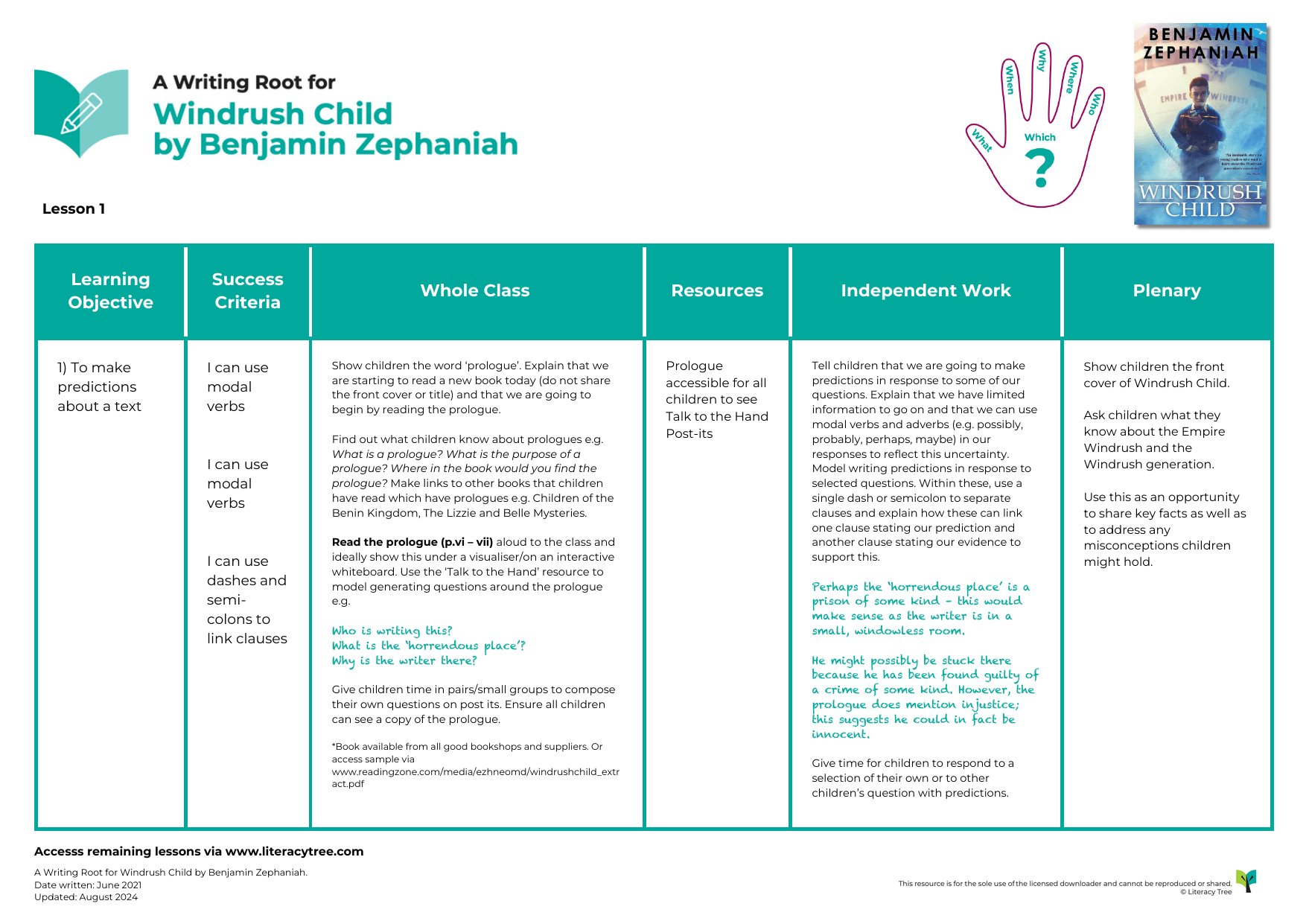
For this stand-alone lesson plan you need access to the front cover and prologue of Windrush Child by Benjamin Zephaniah.
The lesson focuses on using modal verbs to reflect uncertainties when making predictions about a text. For example, “He might possibly be stuck there because he has been found guilty of a crime.”
Types of verbs KS2 lesson
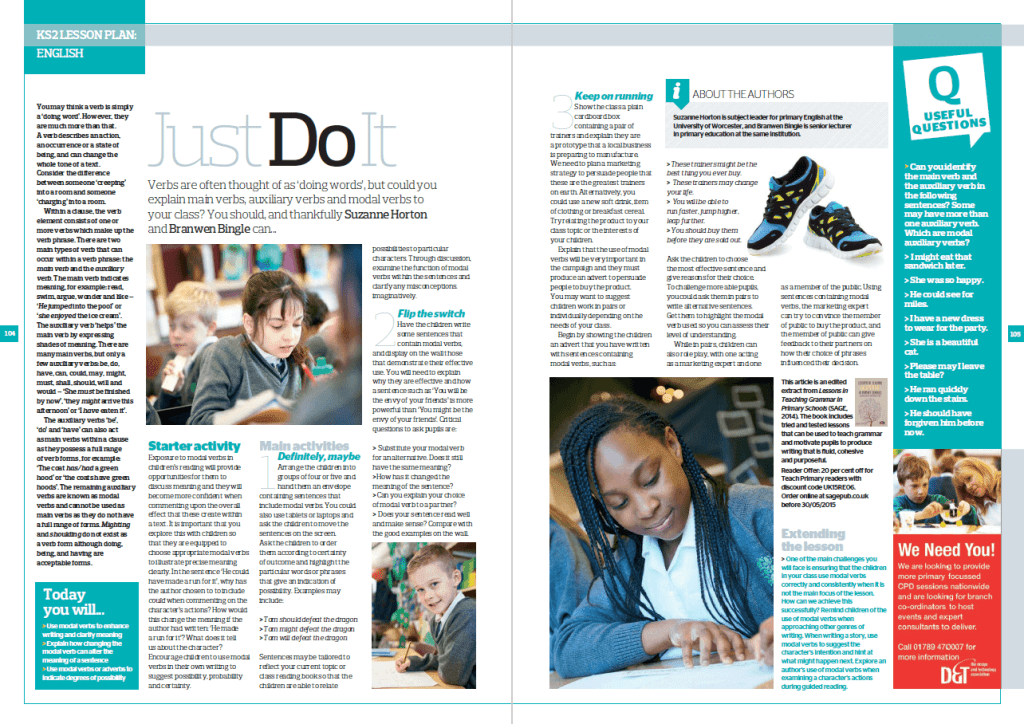
Verbs are often thought of as ‘doing words’, but can you explain main verbs, auxiliary verbs and modal verbs to your class? Suzanne Horton and Branwen Bingle from the University of Worcester show you how in this free lesson plan.
Asian elephants modal verbs KS2 activity

Watch a BBC clip of rescued Asian elephants placing their trust in humans then download this free worksheet from Natural Curriculum. Pupils are tasked with writing a short newspaper article about the elephant theft featured in the clip, featuring modal verbs and modal adverbs.
Modal verb SPaG challenge

This 15-minute SPaG challenge from Plazoom focusing on modal verbs asks students to put words – ‘might’, ‘can’, ‘can’t’, ‘will’, ‘must’, ‘won’t’ – in order from most to least likely, put modal verbs into the blank spaces in sentences and other similar SATs-style questions.
Modal verbs Year 5 worksheet
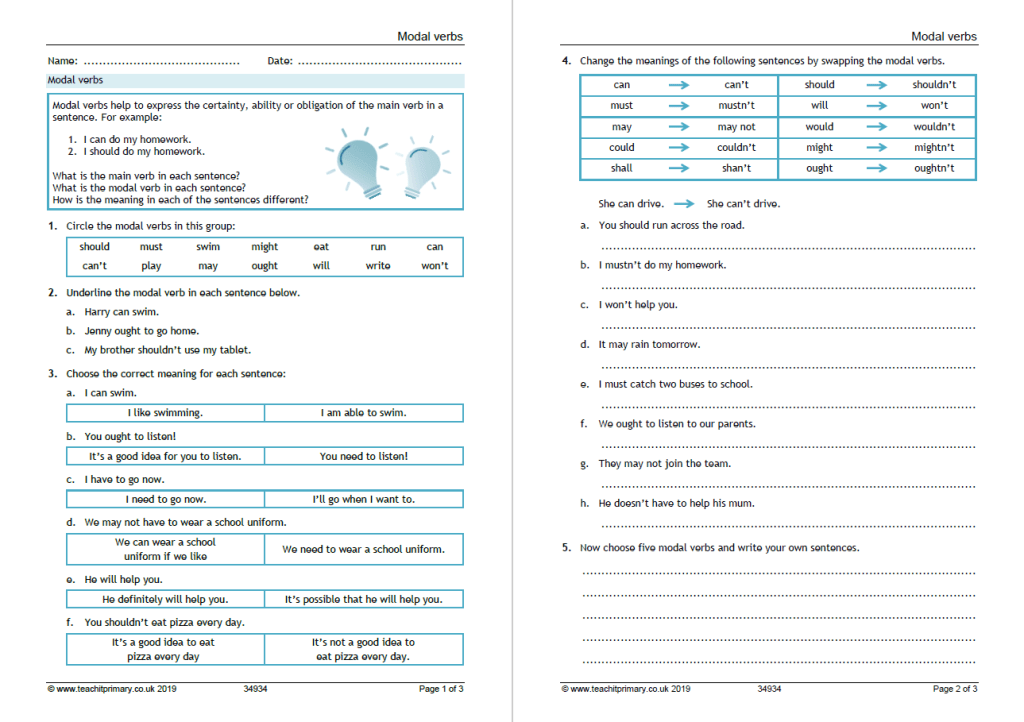
This simple three-page worksheet is useful for consolidating learning on modal verbs for Year 5s. There are two pages of questions and one answer sheet.
Trending
Recognising modal verbs and modal adverbs
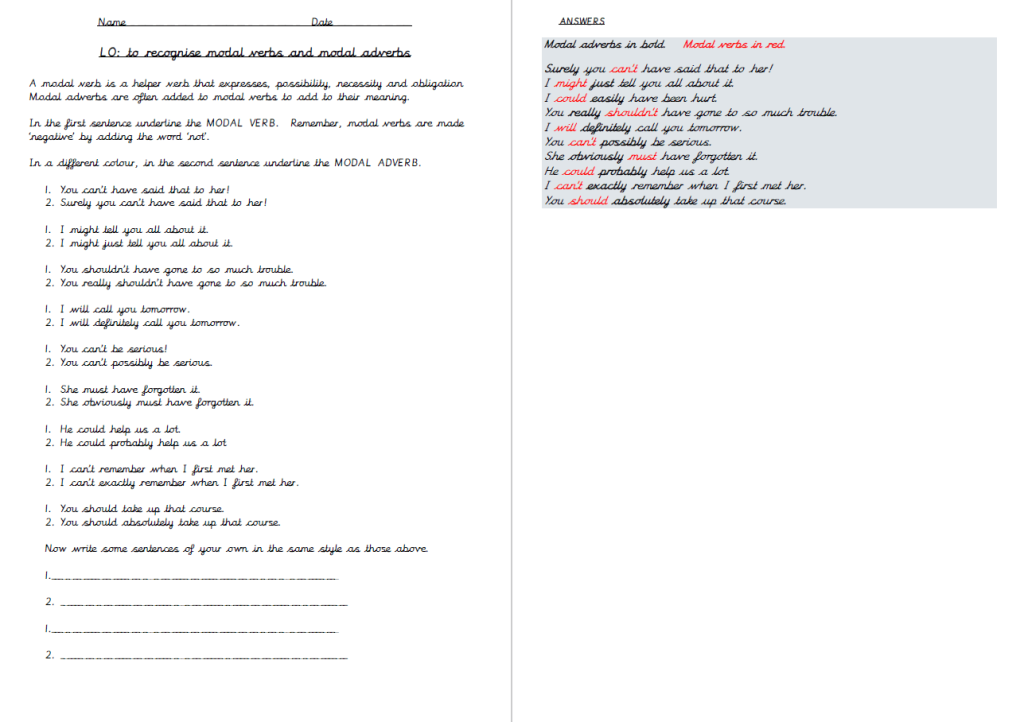
This short worksheet with answers features nine questions, each with two parts. The first features a sentence such as ‘I will call you tomorrow’ and asks students to underline the modal verb.
Then the second asks them to underline the modal adverb in an expanded version of the sentence, in this case ‘I will definitely call you tomorrow’.
Definitions of modal verbs and modal adverbs are included, and answers are provided. There’s also a space for children to write a couple of sentences in the same style using modal verbs and modal adverbs.
Modal verbs wordsearch
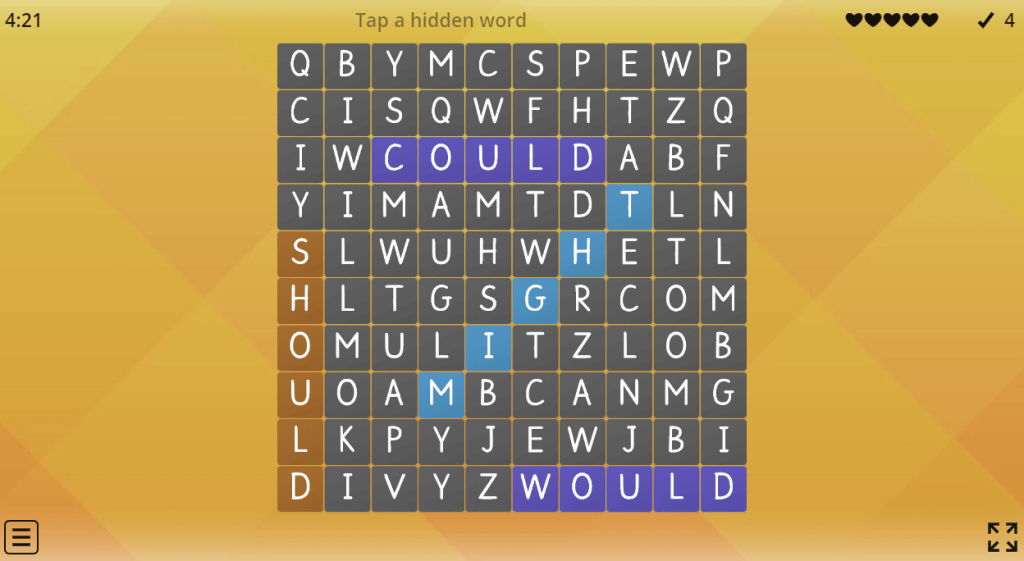
Give students a bit of fun with this interactive wordsearch. They have five minutes to try to find as many modal verbs as they can.
Different types of modal verbs and their applications
Possibility
These verbs encompass advice and direction and express personal actions and intents. They add a layer of uncertainty or potential to statements, making them suitable for discussing possibilities and promises. Examples include modal verbs like:
- might
- could
- would
These are versatile in guiding others and describing one’s actions or plans.
Prohibition
Modal verbs that express obligation and necessity are crucial for giving clear and direct instructions. Examples include:
- must
- have to
- should
They are often used to assertively guide a reader or listener, providing unambiguous directions for specific actions or behaviours in various situations.
Suggestion
These modal verbs offer advice or suggest actions. They are typically used in contexts where a more diplomatic or conversational tone is appropriate, avoiding the directness of a command. Examples are:
- could
- should
- ought to
- had better
Their use is prevalent in situations requiring a more polite or less formal approach.
Ability
These modal verbs express someone’s skill or competence in doing something. ‘Can’ often indicates a general ability, while ‘could’ can suggest a more conditional or past ability. For example, ‘I can swim’ shows current ability, whereas ‘I could swim when I was younger’ implies an ability in the past.
Permission
‘May’ and ‘can’ are used to give or seek permission. ‘May’ is more formal and polite, often used in official or respectful requests, like ‘May I leave the room?’.
‘Can’, on the other hand, is more informal and commonly used in everyday situations, like ‘Can I borrow your pen?’.
Conditional verbs
These are typically used in hypothetical or conditional statements. ‘Would’ is often used to talk about choices or actions under specific conditions, like ‘I would travel if I had more time’. ‘Could’ indicates possibility under certain conditions, such as ‘I could go to the party if I finish my work early’.
Link to persuasive writing
Modal verbs, as auxiliary elements in a sentence, have a unique role in shaping the tone and intent of the main verb. They are the subtle yet powerful tools that can turn a simple statement into one of necessity, possibility, permission, or conviction.
In persuasive writing, their usage becomes even more significant. When a modal verb like “must” or “will” is introduced, it does more than just support the main verb; it transforms the sentence into a stronger, more compelling statement.
For instance, saying “You must consider…” instead of just “Consider…” lends an air of urgency and authority to the suggestion. It’s no longer just an option; it becomes almost an imperative, nudging the reader or listener towards a particular stance or action.
In persuasive writing, these modal verbs become crucial in crafting arguments that resonate with the audience. They help students articulate their points with greater clarity and conviction.
For example, using modal verbs like “could” or “might” in a debate or persuasive essay introduces possibilities and hypothetical scenarios, inviting readers to consider alternatives or consequences.
Teaching students to use these verbs skillfully is to empower them with the ability to express their opinions with confidence and persuasiveness.
Emma Cate Stokes is a freelance writer and former primary teacher. Follow Emma at @emmccatt.









